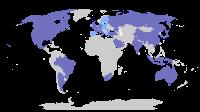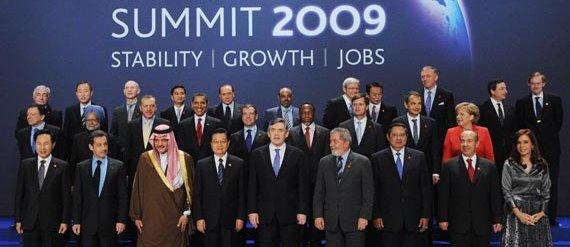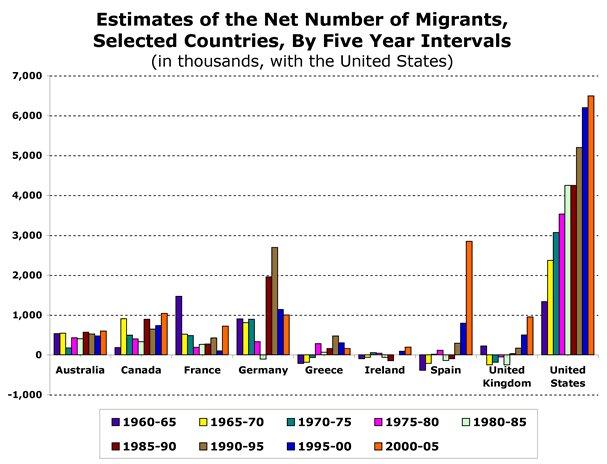G20 Discussions
The G20 was established on August 20, 2003. Nineteen countries and the European Union meet to
discuss the world's financial health. This year, they had a lot to discuss.

- G-20 Major Economies
http://en.wikipedia.org/wiki/G20_industrial_nations
- The G-20 is a group of finance ministers and central bank governors from 20 economies:
19 of the world's largest national economies, plus the European Union. It also met twice at
heads-of-government level, in November 2008 and again in April 2009. Collectively, the
G-20 economies comprise 85% of global gross national product, 80% of world trade and
two-thirds of the world population.
On the surface, the G20 addressed attempts to restart the world's struggling economies and shore up the
world's struggling banking systems. They also announced that they discussed greater regulation of the
financial sector, to avoid disasters like the recent sub-prime housing disaster.

- G-20 Pumps $1 Trillion into Beating Recession
April 2, 2009
http://www.cnn.com/2009/WORLD/europe/04/02/g20/index.html
- Leaders of the world's largest economies agreed on Thursday to a package worth more
than $1 trillion to tackle the global economic crisis. The deal agreed by the leaders of the
world's largest economies included reform of the international banking system and the
injection of more than $1 trillion into the world financial system. There had been concerns
that a rift was opening up between the approach being championed by the U.S. and Britain
- more economic stimulus - and that favored by France and Germany - more banking
regulations. The six-point plan includes banking reform measures and more than $1 trillion
to be spent on restoring credit, growth and jobs, as well as measures clamping down on
tax havens and a commitment to build a green and sustainable economy.
Much of the G-20 communique issued at the end of the London summit restated promises
and goals that international leaders had made earlier. Brown said: "I think a new world
order is emerging and with it the foundations of a new and progressive era of international
cooperation." Along with existing national stimulus measures, Brown said efforts to bolster
economies amounted to more than $5 trillion. The G-20 members will also establish a new
Financial Stability Board to provide "early warning of macroeconomic and financial
risks."
The G20 is also rumored to have discussed a one world currency, a matter covered by our March 29,
2009 newsletter. Beyond a one world currency, they apparently also discussed a "new world order",
per Prime Minister Brown's comments above. Conspiracy theorists are no doubt shuttering at the
thought that the G20 is getting huggy with the concept of a new world order, long viewed to include the
enslavement of humanity by the elite. Per the Zetas, the banking industry is the party who would be most
interested in such a control structure, as world control would eliminate any chance the common man
could escape the grasp of their creditors.
ZetaTalk Prediction 7/15/1995: Who are those attempting to establish the New World Order? The
banking industry, first and foremost, as finances are such a fragile thing. Finances are built only
upon faith. In fact, they have no substance whatsoever. All those high paid salaries - poof! All
that chatter about the value of this stock or that, the carefully monitored stock and bond listings,
it is all just so much hot air. They are talking about nothing. They fear the populace will wake up
to that. One must realize that bankers and stock brokers and bond dealers do not have
alternative professions. There are only so many accountants employable, and most work for little
pay and under pressure to be exacting. Who needs overpaid hot air bags? What would happen to
their world if people stopped thinking that their hard earned savings were safe and secure in
their hands? The crash of 1929, for one. Bankers jumping out of windows, as the thought of
having to do an honest days work was just to much to bear.
Given that heads of state were in attendance, and given that the Earth changes caused by Planet X are
on the increase, inquiring minds want to know if any other topics were discussed at the G20 meeting.
Question: Did the heads of state talk about Planet X and the cover-up during the G20 summit?
Did they share any new information?
ZetaTalk Comment 4/4/2009: We have mentioned previously that the touchy subject of the
presence of Planet X in the inner solar system and pending passage are most often discussed
during face-to-face meetings. This is because phone conversations, however secure, or written
message, however secure, can be intercepted and broadcast to the populace at large. This is the
fear. Thus, a meeting such as the G20 is an ideal opportunity for those face-to-face meetings.
We have previously mentioned that only the major countries were in the know decades ago, but
that this changed during the Bush administration. After invading Iraq, Bush met with many heads
of state ostensibly to mend fences over the war. This was not the whole agenda, obviously. The
stunned look on many faces during photo ops showed that something stunning was discussed.
Many countries were informed, had to be because the Second Sun was showing dramatic second
sunrise or sunsets around the world. These countries were told that Planet X would pass
uneventfully, except perhaps for high tides or a few quakes, and that the real danger was from
panic in the public.
Since that time, not much has changed. The degree to which the Earth changes have picked up
are hidden from all but the most technological country's heads of state. The USGS lies about the
number of quakes and the magnitude. The US and Russia collude to lie about a satellite crash
over Siberia and problems with the ISS. NASA and JPL lie about what their probes are finding.
But the heads of state do understand that the economies of the world will not improve as long as
drought and deluge and imploding buildings continue. Food shortages are acute. All economies
are struggling.
So regardless of whether this is posited as Earth changes due to the presence of Planet X or
posited as problems with the economy, the issues are the same. Thus, these were the issues
discussed during the G20, not Planet X specifically. To the extent that Planet X was discussed, it
was to confirm that things were the same as the last time discussed, no changes.
Perhaps we should call the 2009 meeting of the G20 the G21, as yet another interested party showed
up - an array of 9 UFO's, all in 3 neat rows. This was captured quite by accident by Google Earth's new
Street View facility.

- Google Unearthly
30 Mar 2009
http://www.thesun.co.uk/sol/homepage/news/article2348570.ece
- The nine silver spheres hover above a row of shops, including a Coral bookies, on the
internet giant's new Street View service. Baffled ufologist Nick Pope said he was "very
excited" by the image, which he labeled "truly fascinating". Street View, on Google Maps
and Google Earth, shows 360-degree views of 25 cities throughout the country.
Mark-to-Market
Much discussed in the financial sectors since the crash on Wall Street last fall is the mark-to-market rule,
which had been forcing banks to declare the current market worth of their assets on their books. With
the value of real estate plunging, the value of mortgages on the bankers' books was diminished. How to
make those bankers loosen up and feel rich once again, so they would lend money and stimulate the
economy? Allow those mortages they were holding to be worth more. Thus, the mark-to-market rule
was relaxed, so banks can declare the value of homes at a higher price, and feel rich again.
- Mark-to-Market Accounting
http://en.wikipedia.org/wiki/Mark-to-market
- The debate arises because this accounting rule requires companies to adjust the value of
marketable securities (such as the mortgage-backed securities at the center of the crisis) to
their market value. The intent of the standard is to help investors understand the value of
these assets at a point in time, rather than just their historical purchase price. Because the
market for these assets is distressed, it is difficult to sell many mortgage-backed securities.
As initially interpreted by companies and their auditors, the typically lower sale value was
used as the market value rather than the cash flow value. Many large financial institutions
recognized significant losses during 2007 and 2008 as a result of marking-down
mortgage-backed securities asset prices to market value.
-
- FASB Approves More Mark-to-Market Flexibility
April 2, 2009
http://www.marketwatch.com/News/Story/fasb-approves-more-mark-to-market-flexibility/
- Responding to pressure applied by lawmakers on Capitol Hill, the Financial Accounting
Standards Board on Thursday voted unanimously to give auditors more flexibility in
valuing illiquid mortgage assets that may have long-term value. The new guidance, which
is expected to boost bank operating profits when they report first quarter results later this
month, alters so called mark-to-market rules, which have required banks and other
corporations to assign a value to an asset, such as mortgage securities, credit-card debt or
student-loan investments, based on the current market price for either the security or a
similar asset. Banks have complained that they have viable assets with strong cash flows
that can't be sold because there is no market for them.
Per the Zetas, this is all an illusion. So if you start hearing that the picture is brighter, consider the artists
who are painting this picture.
ZetaTalk Comment 4/4/2009: This accounting switch allows banks to loan out more than
formerly, as their debts are viewed differently. The weight of bad debts, such as subprime
mortgages, thus are less of a drag. The overall picture still remains the same, but the illusion of
health is smeared over all.
Per the Zetas, the monetary system is fragile, a virtual confidence game, slowly on its way to becoming
the barter system where the real value of an item is presented during an exchange.
ZetaTalk Prediction 12/15/1996: The world banks are justified in their constant fretting about the
health of their industry during the panic that will occur going into the cataclysms. The worth of
paper money is a fragile thing, based more on confidence than anything, paper money can plunge
in value overnight, and often does in unstable countries where printing more paper money is seen
as the solution to underfunding of government ambitions. History has shown that banks and the
value of the dollar fall during economic depressions, and the years preceding the coming
cataclysms will see crop failures in the face of atypical weather and intractable droughts,
insurance company failure due to weather and earthquake severity, and a general lack of
confidence. In the face of lack of faith in the paper money system the world banking community
has come to rely upon, there will be a return to the simple method of barter - you give me a
bushel of apples and I'll give you two gallons of milk. People long reliant upon credit and
shopping will begin to lower their debt and begin to rely upon themselves, leaving the banking
industry without customers. This will of course create a panic of sorts within the banking
industry, which like organized religions are seeing their economic base shrinking.
Migration Surge
The Zetas predicted, in 1999, that migration would start to increase, and it has!
ZetaTalk Prediction 4/15/1999: You will find human populations beginning to migrate. These
migration not only happens in cases of severe starvation, such as in northern Africa south of the
Sudan, where people just stumble like sticks in any direction, looking for food, but also occurs
when things get bad enough, when crop shortages are bad, and people begin to wander. They're
looking for something better. So you will have migrations and you will have guards against
migrations. Rifles at the border, pointed and saying don't come a step further and shooting
people for little reason. This is already starting to raise its head in the anxiety that the United
States expresses about the people south of their borders.

SOURCE: http://www.migrationinformation.org/datahub/charts/5.1.shtml
Indeed, the US began to struggle with increased migration from south of its borders. By 2006, this was
declared a tsunami.
- Flood of Illegals Turns into a Tsunami
Mar 29, 2006, 04:34
http://www.capitolhillblue.com/
- Sen. Lindsey Graham hears about illegal immigration whenever he travels his home state
of South Carolina. And for good reason. South Carolina, a state with historically few
illegal immigrants, saw a 1,000 percent increase in their numbers from 1990 to 2004. With
55,000 undocumented residents, South Carolina ranks far behind the nation's leader,
California. But the issue is boiling throughout the country as illegal immigrants make their
way to more cities and states than ever.
But migration has become a problem around the world, most recently hitting the press when a ship
carrying hundreds of illegal immigrants from Libya to Italy went down.
- Ship Carrying 257 Migrants Sinks off Libya Coast
March 30, 2009
http://rawstory.com/news/afp/Ship_carrying_257_migrants_sinks_of_03302009.html
- A ship carrying more than 250 illegal migrants headed for Europe has sunk near the
Libyan coast with dozens of people feared to have drowned. Italy announced that it will
soon launch joint sea patrols with Libya aimed at stopping the heavy influx of illegal
immigrants using Libya as a transit point. Interior Minister Roberto Maroni said the
patrols will begin on May 15, a day he expects to "mark the end" of illegal migration from
North Africa. His comments came a day after more than 460 illegal immigrants were found
off the coasts of Sicily and Lampedusa and another 166 around the Sicilian city of Catania.
Italy and Libya signed a deal in August 2008 under which Tripoli committed itself to
reinforce the fight against illegal immigration by taking part in joint sea patrols. Nearly
37,000 illegal immigrants landed on Italian coasts last year, a 75-percent rise from 2007,
according to the interior ministry in Rome.
Increasingly, sympathy for the migrants is being replaced by slamming doors. Per the Zetas, this trend
will continue as the time of the pole shift approaches. And travel restrictions even for the citizenry within
a country may be imposed, suddenly.
ZetaTalk Prediction 1/7/2003: Travel restrictions will likely be imposed by governments in
response to migrations, but not until this occurs. Thus, this will vary by country, within country,
and in truth is in place long before pole shift issues such as weather changes and increasing
starvation occurr. The US has restrictions on immigration from Central America and Mexico,
but wet backs and illegal nannies employed in the US have been a long standing problem. North
Korea is starving, the starving children among the populace creeping into China to raid fields
and beg food ongoing for some years. This is controlled not by the Chinese, who themselves are
starving, but by the North Koreans, who do not want the world to know of their state. Where
sudden homelessness or joblessness is cared for in some manner in situ, at the site, there will be
no migration and no travel restrictions.
An earthquake ravaged city, with tents cities placed on the perimeter and military to prevent
looting, will find the majority of the populace in place, waiting for supper and not arguing with
their military guards when told to return to their tents as there are looters afoot and they want
the survivors to be safe. If a long time running until the shift, months, such a tent city will need to
clear travel for those parties who have relatives or second homes elsewhere, and passes will be
issued under the guise of a pass so the military will allow passage, not think the travelers looters.
Where life goes on, unaffected by high tides or ravaged by weather or quakes, travel will in all
likelihood be similar to today, to seek work or to visit relatives or whatever. There will be less
travel, during hard times, for entertainment, as the airline industry has already noted. Thus, until
the week going into the shift, when all controls are likely to be lifted due to distraction by those
assigned to enforce the restrictions, any number of controls may be imposed, and suddenly, based
on Earth changes. This is one reason to be in your chosen safe location early, and if not possible,
to have valid excuses to be there should you need the excuse.
You received this Newsletter because you Subscribed to the ZetaTalk Newsletter service. If undesired, you can quickly
Unsubscribe.
|

